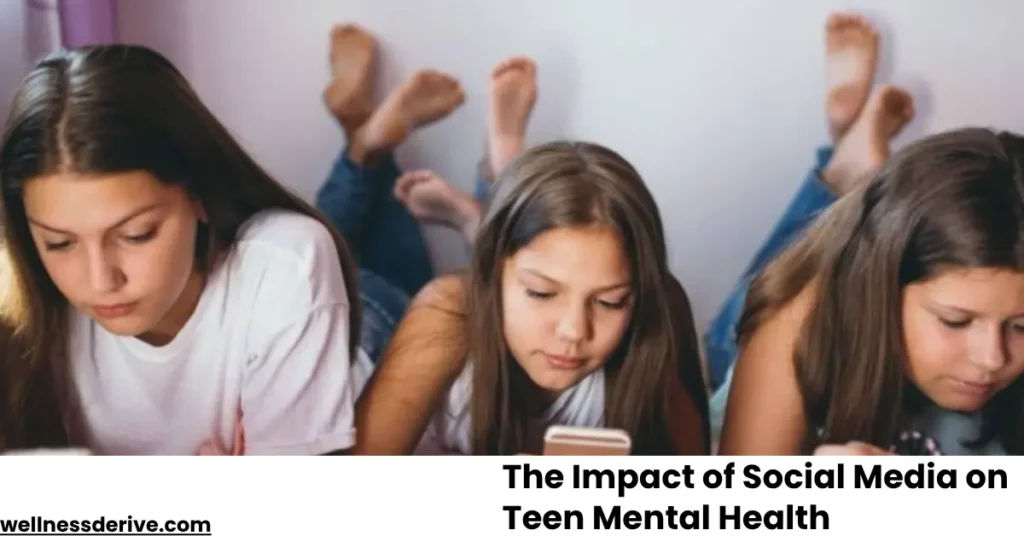Social media has become integral to daily life, especially for teens. It shapes how you communicate, view yourself, and interact with the world. While social media platforms offer ways to connect, share, and express yourself, they can also contribute to mental health concerns like anxiety, depression, and low self-esteem.
Research by the Surgeon General’s Advisory proves that social media and mental health are deeply intertwined. Social media may promote negative experiences by magnifying your inadequacies. Understanding how social media usage affects youth mental health is key to balancing the positive and negative effects.
This article explores practical tips for teens and parents to manage social media’s impact on mental health. You will discover strategies for you and your teen to foster a balanced online experience.
How Social Media and Mental Health Are Connected
Social media apps are designed to keep you engaged, often triggering the brain’s reward center with likes and notifications. Excessive use leads to poor mental health, including sleep problems, social anxiety, and even eating disorders.
95% of teens access social media regularly, spending up to five hours daily. Scrolling through these platforms takes precious time that could be used to learn a new hobby, only to end up feeling worse about their own life.
Studies from the Pew Research Center show that many teens feel pressure to check social media constantly. This fear of missing out can fuel anxiety and leave lasting emotional scars. Negative posts, online abuse, and the spreading of hurtful rumors can further damage a teenager’s health.
Social Media Use and Mental Health Challenges for Teens
Social media often promotes unrealistic standards, impacting body image and self-esteem. Young people, especially girls, may feel compelled to conform to unrealistic standards, leading to eating disorders and self-harm.
Teens face social pressures to fit in, and social media can intensify this by spreading hurtful rumors or exposing them to harmful content. Adverse experiences like trolling can make you feel worse about your life and trigger a mental health condition.
Constant comparisons to other people’s vacations, parties, or achievements can make tough times even heavier, leaving you questioning your self-worth.
Positive Aspects of Social Media
Despite the risks, social media has valuable attributes, which include:
- Many teens feel supported through online communities where they share struggles and find encouragement.
- Platforms like TikTok and Instagram allow you to connect with others who share your interests, providing a sense of belonging.
- Social media apps offer a canvas for creative expression through art, music, or personal stories.
- Engaging with positive content, like motivational posts or educational videos, can inspire you to pursue goals and feel empowered.
Practical Tips for Teens
Small changes can make a big difference, especially if social media affects your mental health. To create a healthier relationship with social media sites:
1.) Set Time Limits for Social Media Usage
Excessive screen time can interfere with actual life connections and outdoor activity. Try:
- Setting app limits on your phone
- Scheduling tech-free zones (for example, during meals or before bed)
- Replacing scrolling with hobbies or family activities
2.) Curate Your Feed for Positive Content
Unfollow accounts that make you feel worse about yourself. Instead, follow pages that inspire your creative side or promote body positivity. This helps protect your self-worth and mental health.
3.) Avoid Comparing Yourself to Others
Remember, people only share the best parts of their lives online. Comparing your daily life to someone else’s highlight reel can lead to feelings of loneliness and low self-esteem. Focus on your growth instead of being obsessed with friends’ lives.
4.) Report Cyberbullying and Harmful Content
If you experience online abuse or see malicious content, report it. Spreading hurtful rumors or negative posts can leave lasting emotional scars; don’t hesitate to block or report users who engage in such behavior.
Tips for Parents to Support Their Teen’s Health
As a parent, you play a crucial role in managing your child’s social media use. Below is how you can be a role model and help them navigate social media pressures and mental health issues.
1.) Model Healthy Social Media Habits
Young users learn from adults. You can be a good example by:
- Not constantly checking social media
- Prioritizing in-person interactions
- Discussing how social media affects your overall well-being
2.) Encourage Open Communication
Talk to your teen about their social media experiences. Ask about their favorite platforms, what they enjoy, and any challenges they face. If they mention feeling lonely or struggling with self-esteem, listen without judgment. Open communication builds trust and helps you address mental health problems before they escalate.
3.) Promote Balance With Offline Activities
Encourage your teen to balance social media with offline pursuits like physical activity, hobbies, or family time. Activities like sports or board game nights can be more fun than endless scrolling.
4.) Monitor Without Invading Privacy
Stay aware of your teenager’s social media apps without being overly controlling. The surgeon general’s advisory recommends you regularly review your child’s social media use during the early teen years.
Key Findings on Social Media and Adolescent Health
Recent research from the Pew Research Center highlights key findings on social media and youth mental health:
- Gender differences exist in how young adults experience social media
- Risk-taking behaviors and social anxiety are linked to excessive use
- Positive online identities can boost self-expression, while negative ones can damage it
Balancing Screen Time and Overall Well-Being
Taking breaks can help you re-examine how social media impacts your mental health. Try spending a day without social media and notice how you feel. Many teens find they’re more present in real life.
Focus On Real-Life Connections
Human beings thrive on face-to-face interactions. Spend time with friends offline, engage in physical activity, or explore new hobbies. These experiences often bring more joy than scrolling.
Seek Help if Needed
If social media is fueling anxiety, depression, or other mental health concerns, talk to a trusted adult or seek mental health resources. You don’t have to navigate these challenges alone.
Finding Balance for Young People
Social media is a powerful tool, but it shouldn’t control your well-being. Setting boundaries, fostering real-life connections, and being mindful of time spent on social media can enable you to enjoy the positive aspects while minimizing the negative impact.
Remember, your mental health matters more than likes or followers. Take small steps today to create a healthier, happier relationship with social media and a better life.
Disclaimer: The content on Wellness Derive is for informational purposes only and not a substitute for professional medical advice, diagnosis, or treatment. Always consult a healthcare provider for medical concerns.



